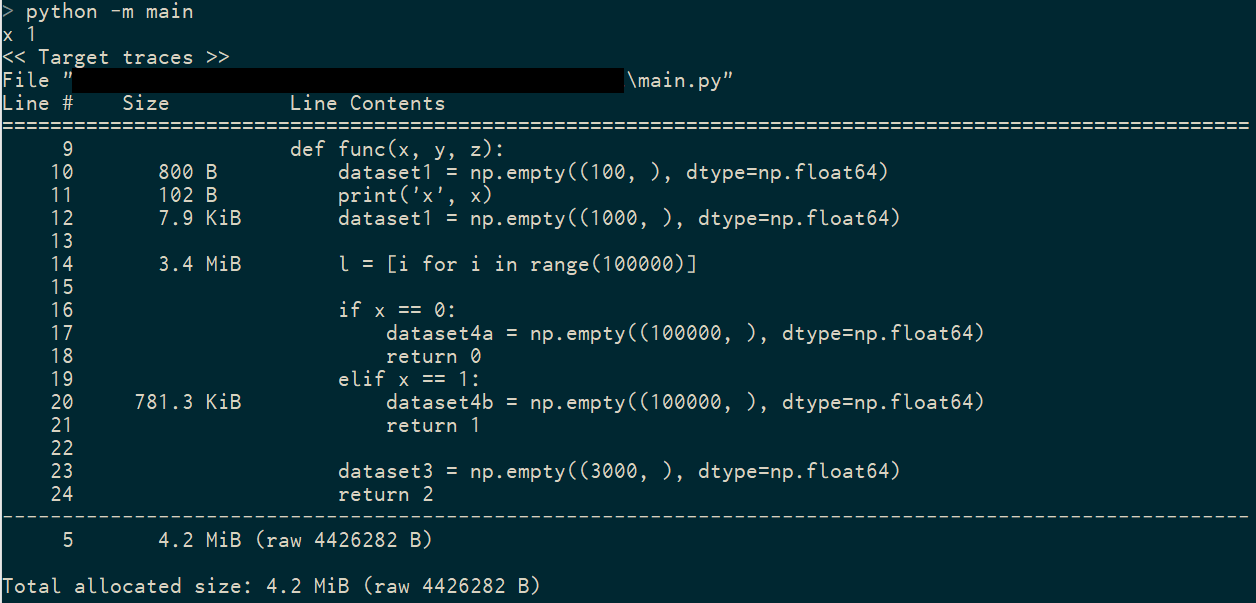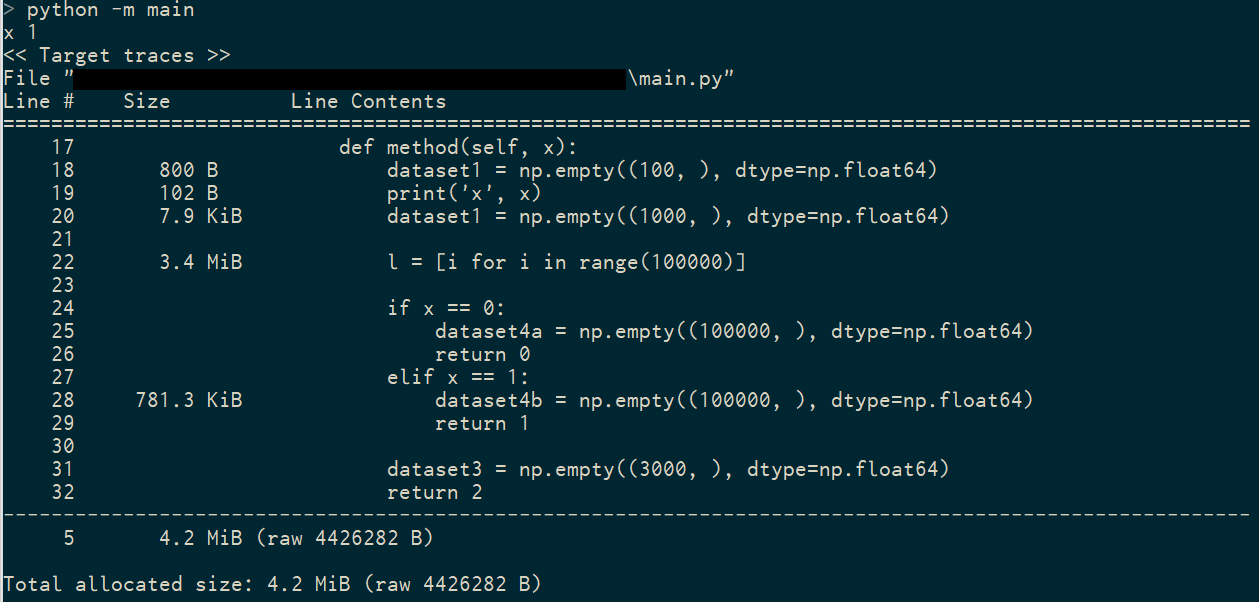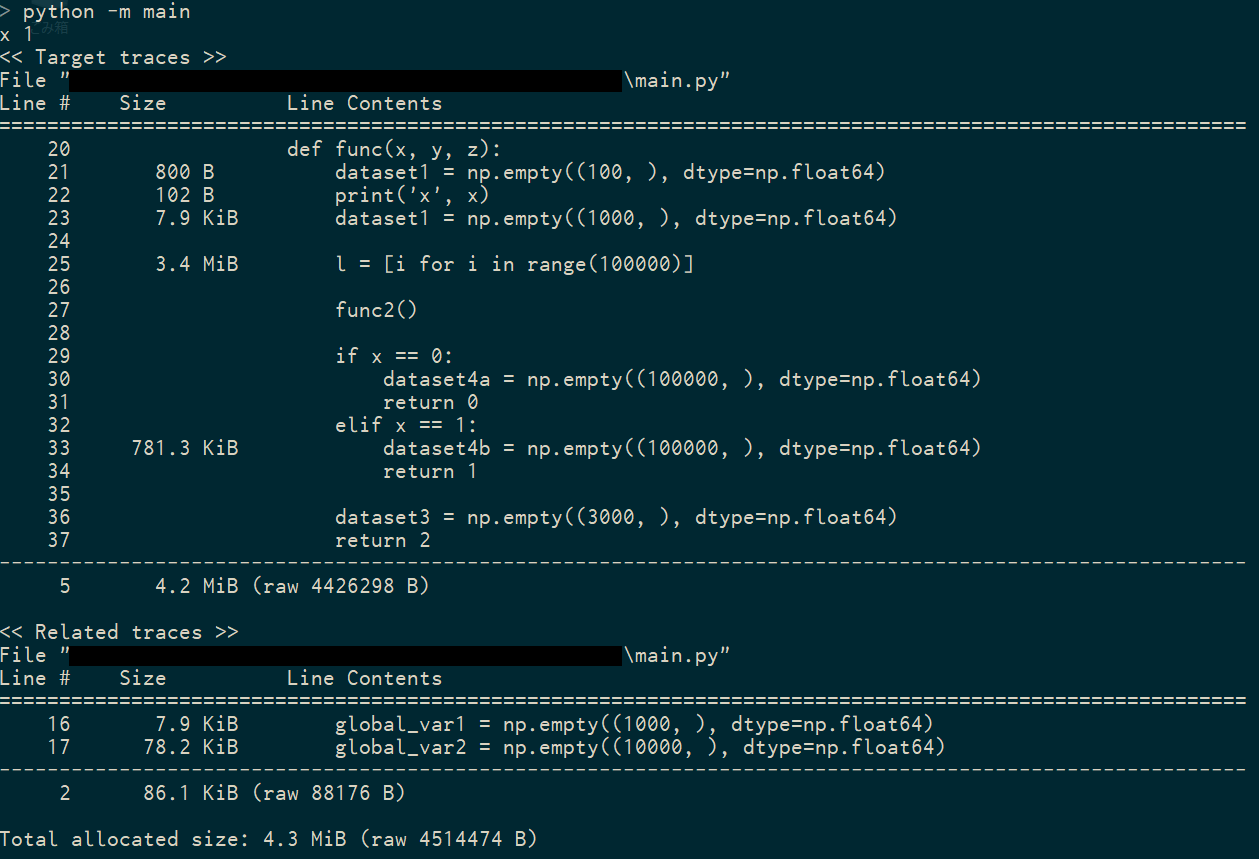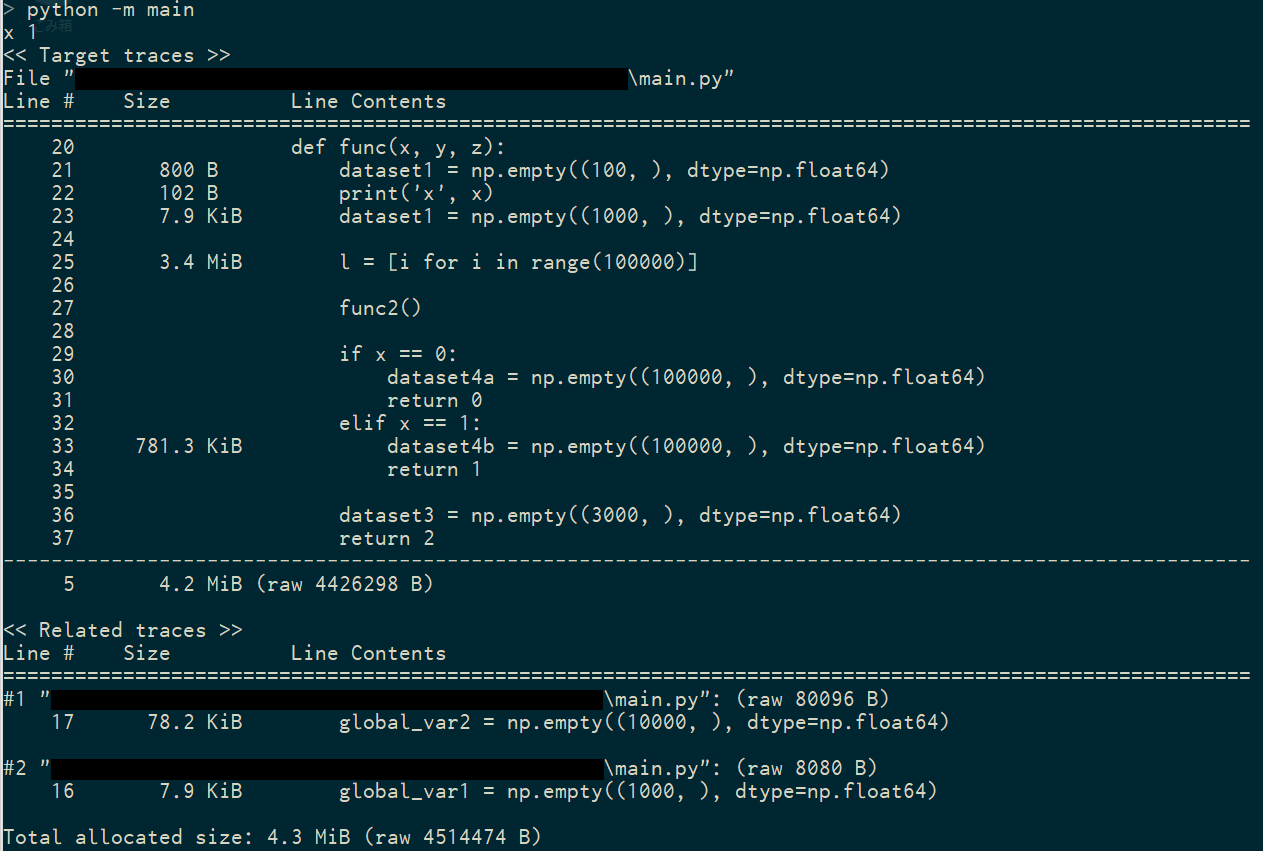malloc_tracer
About
This is a debugging tool for tracing malloc that occurs inside a function or class.
import numpy as np
import malloc_tracer
def func(x, y, z):
dataset1 = np.empty((100, ), dtype=np.float64)
print('x', x)
dataset1 = np.empty((1000, ), dtype=np.float64)
l = [i for i in range(100000)]
if x == 0:
dataset4a = np.empty((100000, ), dtype=np.float64)
return 0
elif x == 1:
dataset4b = np.empty((100000, ), dtype=np.float64)
return 1
dataset3 = np.empty((3000, ), dtype=np.float64)
return 2
tracer = malloc_tracer.Tracer(func)This is equivalent to the following code.
import numpy as np
from tracemalloc import start, take_snapshot, stop
SNAPSHOT = None
def func(x, y, z):
try:
start()
dataset1 = np.empty((100,), dtype=np.float64)
print('x', x)
dataset1 = np.empty((1000,), dtype=np.float64)
l = [i for i in range(100000)]
if (x == 0):
dataset4a = np.empty((100000,), dtype=np.float64)
return 0
elif (x == 1):
dataset4b = np.empty((100000,), dtype=np.float64)
return 1
dataset3 = np.empty((3000,), dtype=np.float64)
return 2
finally:
global SNAPSHOT
SNAPSHOT = take_snapshot()
stop()Feature
Compatibility
malloc_tracer works with Python 3.4 or higher.
Dependencies
Installation
pip install malloc-tracer
Usage
Trace a function.
import numpy as np
import malloc_tracer
def func(x, y, z):
dataset1 = np.empty((100, ), dtype=np.float64)
print('x', x)
dataset1 = np.empty((1000, ), dtype=np.float64)
l = [i for i in range(100000)]
if x == 0:
dataset4a = np.empty((100000, ), dtype=np.float64)
return 0
elif x == 1:
dataset4b = np.empty((100000, ), dtype=np.float64)
return 1
dataset3 = np.empty((3000, ), dtype=np.float64)
return 2tracer = malloc_tracer.Tracer(func)
tracer.trace(
target_args=dict(x=1, y=2, z=3)
)Trace a method.
import numpy as np
import malloc_tracer
class Klass(object):
CONSTANT = 'CONSTANT'
def __init__(self, value):
self._value = value
def method(self, x):
dataset1 = np.empty((100, ), dtype=np.float64)
print('x', x)
dataset1 = np.empty((1000, ), dtype=np.float64)
l = [i for i in range(100000)]
if x == 0:
dataset4a = np.empty((100000, ), dtype=np.float64)
return 0
elif x == 1:
dataset4b = np.empty((100000, ), dtype=np.float64)
return 1
dataset3 = np.empty((3000, ), dtype=np.float64)
return 2
@staticmethod
def smethod():
dataset = np.empty((100, ), dtype=np.float64)
l = [i for i in range(100000)]
print('Hello')
return dataset
@classmethod
def cmethod(cls, var):
return cls.CONSTANT + varinstance = Klass(1)
tracer = malloc_tracer.Tracer(instance.method)
tracer.trace(
target_args=dict(x=1)
)Trace a static method.
tracer = malloc_tracer.Tracer(Klass.smethod)
tracer.trace(
target_args=dict()
)Trace a class method.
tracer = malloc_tracer.Tracer(Klass.cmethod)
tracer.trace(
target_args=dict(var='Hello world.')
)Displays related traces for each file.
import numpy as np
import malloc_tracer
global_var1 = None
global_var2 = None
def func2():
global global_var1
global global_var2
global_var1 = np.empty((1000, ), dtype=np.float64)
global_var2 = np.empty((10000, ), dtype=np.float64)
def func(x, y, z):
dataset1 = np.empty((100, ), dtype=np.float64)
print('x', x)
dataset1 = np.empty((1000, ), dtype=np.float64)
l = [i for i in range(100000)]
func2()
if x == 0:
dataset4a = np.empty((100000, ), dtype=np.float64)
return 0
elif x == 1:
dataset4b = np.empty((100000, ), dtype=np.float64)
return 1
dataset3 = np.empty((3000, ), dtype=np.float64)
return 2tracer = malloc_tracer.Tracer(func)
tracer.trace(
target_args=dict(x=1, y=2, z=3),
related_traces_output_mode=malloc_tracer.RelatedTracesOutputMode.FOR_EACH_FILE
)Displays related traces in descending order.
tracer = malloc_tracer.Tracer(func)
tracer.trace(
target_args=dict(x=1, y=2, z=3),
related_traces_output_mode=malloc_tracer.RelatedTracesOutputMode.IN_DESCENDING_ORDER
)Convenience function.
malloc_tracer.trace(
func,
target_args=dict(x=1, y=2, z=3),
related_traces_output_mode=malloc_tracer.RelatedTracesOutputMode.IN_DESCENDING_ORDER
)License
This software is released under the MIT License, see LICENSE.







